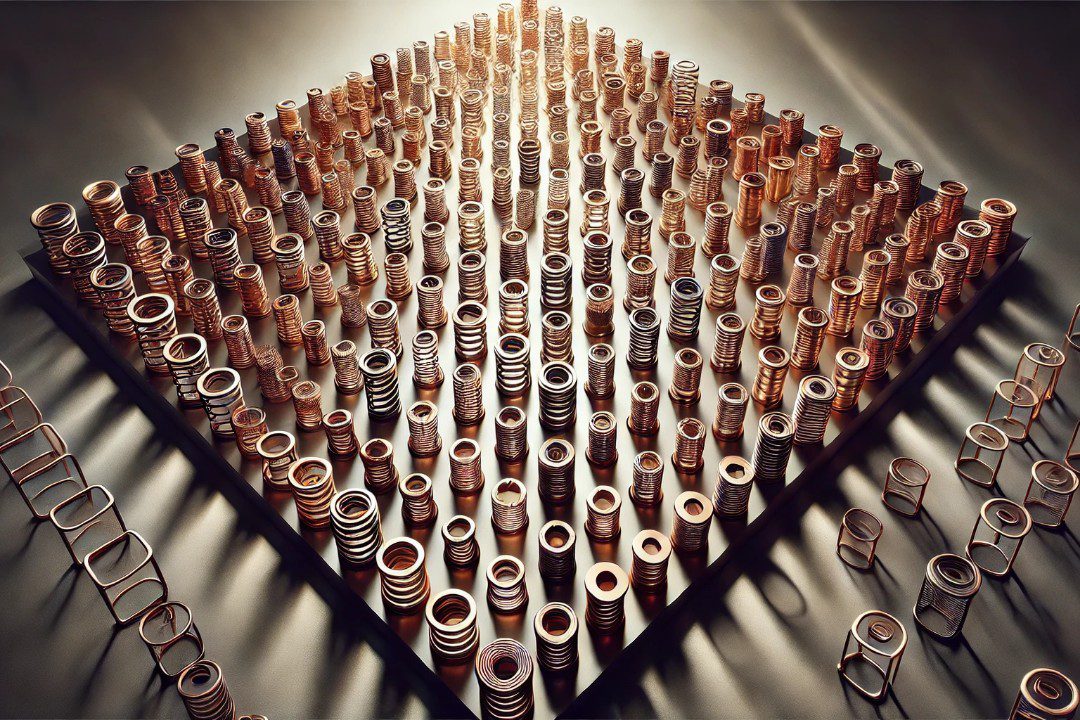Beryllium copper, also known as beryllium bronze, is a copper alloy known for its exceptional strength, corrosion resistance, and conductivity.
This versatile material is widely used in spring and wire form manufacturing for applications requiring a combination of durability, electrical conductivity, and non-magnetic properties.
At Western Spring Manufacturing, beryllium copper is used to produce high-quality custom springs and wire forms tailored to industries like aerospace, medical, and telecommunications, where performance under extreme conditions is essential.
Material Composition and Grades
Material Composition
Beryllium copper alloys are primarily composed of copper and beryllium (0.5% to 3%), with small amounts of other elements like nickel or cobalt, depending on the specific grade. This composition gives the material its unique combination of properties, including high strength and conductivity.
Common Grades
C17200 (Alloy 25)
- Composition: Approximately 2% beryllium and 0.5% cobalt.
- Properties: High strength and hardness after heat treatment, excellent conductivity, and corrosion resistance.
- Applications: Springs and wire forms in aerospace, automotive, and oil and gas industries.
C17500 and C17510
- Composition: Lower beryllium content (0.2% to 0.6%) with nickel or cobalt.
- Properties: Slightly reduced strength compared to C17200 but improved machinability and conductivity.
- Applications: Electrical connectors and components requiring both strength and conductivity.
Properties and Characteristics
Beryllium copper offers a unique combination of properties that make it a top choice for demanding spring and wire form applications.
Mechanical Properties
- High Strength: Can achieve tensile strengths up to 200,000 psi after heat treatment, making it one of the strongest copper-based alloys.
- Excellent Fatigue Resistance: Ideal for applications requiring repeated loading cycles, such as in aerospace and automotive systems.
- Ductility: Allows for complex wire form designs and intricate spring geometries.
Physical Properties
- Corrosion Resistance: Resistant to wear, oxidation, and exposure to harsh chemicals.
- Non-Magnetic: Suitable for applications where magnetism would interfere with performance, such as in medical devices.
- Thermal and Electrical Conductivity: Offers excellent conductivity, making it ideal for electrical connectors and grounding springs.
- Density: Approximately 8.25 g/cm³.
Unique Characteristics
- Heat Treatable: The alloy’s properties can be significantly enhanced through heat treatment, achieving high hardness and strength.
- Non-Sparking: Safe for use in environments with flammable gases or liquids, such as oil rigs or chemical plants.
Spring and Wire Form Applications
Beryllium copper is used across various industries and applications due to its excellent mechanical and physical properties.
Common Applications
- Compression Springs: Used in sensitive applications like medical devices and aerospace equipment for their strength and precision.
- Torsion Springs: Found in electrical switches and connectors where conductivity and fatigue resistance are critical.
- Wire Forms: Used in telecommunications and industrial settings for their corrosion resistance and non-magnetic properties.
Industries Using Beryllium Copper
- Aerospace: Ideal for flight systems and control mechanisms due to its strength, fatigue resistance, and non-magnetic properties.
- Medical: Used in surgical instruments and diagnostic equipment for its biocompatibility and non-corrosive nature.
- Telecommunications: Commonly used in connectors, switches, and grounding components due to its excellent conductivity and durability.
Learn more about spring applications in From Automotive to Aerospace: Applications of Springs in Different Industries.
Advantages and Limitations
Advantages
- Exceptional Strength and Durability: Offers high tensile strength and fatigue resistance, even under extreme conditions.
- Corrosion and Wear Resistance: Suitable for long-term use in harsh environments.
- Excellent Conductivity: Provides superior thermal and electrical conductivity compared to other copper alloys.
- Non-Magnetic and Non-Sparking: Safe for use in sensitive or hazardous environments.
Limitations
- Cost: Beryllium copper is more expensive than other materials like stainless steel or phosphor bronze.
- Toxicity Concerns: Beryllium dust or fumes can pose health risks during machining or processing, requiring proper safety measures.
- Workability: While ductile, the material may require specialized equipment for forming or machining.
Compared with Other Materials
Beryllium Copper vs. Stainless Steel
- Strength: Beryllium copper offers comparable strength to stainless steel but adds the benefit of electrical conductivity.
- Corrosion Resistance: Both materials resist corrosion, but beryllium copper performs better in environments with chemical exposure.
Beryllium Copper vs. Phosphor Bronze
- Strength and Conductivity: Beryllium copper is stronger and offers higher conductivity, while phosphor bronze is more cost-effective for less demanding applications.
Future Trends and Innovations
Advances in Alloys
Research into beryllium-free copper alloys is providing safer alternatives while maintaining many of the benefits of traditional beryllium copper.
Sustainability
Increased focus on recycling and reducing waste during manufacturing is making beryllium copper production more environmentally friendly.
Learn about innovations shaping spring manufacturing in How Automation is Affecting the Future of Spring Manufacturing.

